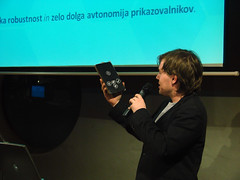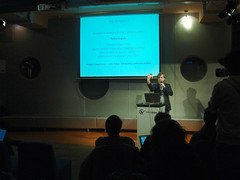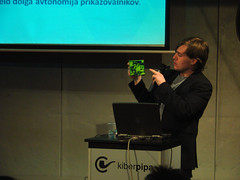Luka Birsa is founder of Visionect d.o.o, Slovenian hardware startup that’s working with e-paper and e-ink technologies and here are my notes from his talk with title – How hard it is to run a hardware startup? at Kiberpipa’s Open Lectures.
Who or what is Visionect

- Image by rok xxx via Flickr
- Three founder, with 5 employees
- Members of TP-LJ and LUI
- Founded 18 months ago
- They’re working in hardware and software business
So what’s a product
- Wireless screen display + application eMenu
Technology
- eInk – e-paper
- low power wireless technology (2.4Ghz proprietary)
- touch screen (projected capacitive)
- low power software concepts (thin client)
Very robust devices with long autonomy.
Why hardware startup?

- Image by rok xxx via Flickr
- Hardware is cool because you can show it to your mother
- You can add LED’s to it and things blink then
- Hardware is cool because you actually take it into your hands
Beginnings
- Luka + Matej – consulting to hotels with IT decisions
- Rok has an idea – lets make electronic price tags for stores (ESL)
- Sounds like a good idea and they try to do it!
1st romantic point of view – doing hardware is simple
- You Google it, draw the integrate curcuit
- You write a software
- You buy components, you start producing
- You can do this really fast
FAIL:

- Image by bootload via Flickr
1. There’s too much choice on the market. Too much choice and data sheets are terrible. You can easily get samples but are useless.
Drawing circuit for yourself is not drawn it for CE certification.
2. You need additional software to do this as well as prototype boards or prototypes of your own product.
3. It’s not worth buying under 1000 pieces and delivery times are around 12-13 weeks. All the distributors are not the sames.
Quality certification ISO 9001 and similar does not equal product quality.
4. The profits are low because of bad partners and problems. It takes about 3 times as long as projected! And you still don’t have certification.
2nd romantic point of view – Slovenia does not equal world
- Lets do ESL
- E Leclerc doesn’t have them, others do
- It seems like a viable niche
- Lets make cool technology and sell it – projected price was 30 eur for 1000 pieces using Zigbee and bistable displays
- The world is ours
FAIL:

- Image by rok xxx via Flickr
1. Slovenia != Europe != World
2. ESL is already a big market with establish market players
3. Actual production cost > 30E.
4. The actual cost is 7 euros per piece
3rd romantic point of view – all that you need is a good business idea/plan
1. Good idea with a good team
2. Good business plan
3. 2 months of looking for seed money + 2 months to do things = money
FAIL:

- Image by TrojanDan via Flickr
1. Good idea doesn’t mean Hi-Tech; Hi-Tech + Slovenia = Problems (FAIL)
2. Good business plan – easier said than done:
Software startup – Hardware startup
Expenses: Less More
Time to market: Less More
Dependency on others: Less More
3. Crash course of investors:
- The never say no
- When they say maybe, it means “no”
- One months is three months
Is there anything positive about it?

- Image by Teone! via Flickr
- There’s already a slew of software startups, so it’s hard to make your investors enthusiastic about your startup. Hardware is as such a plus 🙂
- Nobody does hardware anymore. Easier to bootstrap and more in sourcing offers. New partners, new experiences = better chances for future offer.
- It takes long to invest = good thing in HW startup. More time you have, easier to bootstrap, better business plan etc.
- Long time to enter the market means the same for your competition. Little playes will have hard time cloning your products and big ones are slow to change.
Tips for hardware startups
- When planning, have lots of buffer space
- Talk to other people. You can’t find everything on Internet.
- If you can use off shelf solutions – use it! Never make things yourself! You can’t imagine how hard it is to actually make your own hardware.
Where’s Visionect at the end of this path today?
- Connected with one of the biggest OEM producers in the world
- Lots of experience with producing hardware
- Working prototype of eMenu and BPS system.
![Reblog this post [with Zemanta]](http://img.zemanta.com/reblog_e.png?x-id=5d3dec20-fbc9-4e97-a07a-21affd620bc1)
Thanks for these notes. This was very interesting for me, especially the 'romantic' part — where most of us would fail. Fortunately, we can learn from experience provided by others, like Visionect.
As a stupid non-Slovenian, why is it “Hi-Tech + Slovenia = Problems”?
My impression is that you guys are ahead of the curve and smart enough. Is it reluctance of the potential customers?
The eMenu-idea sounds good, as you're dealing with restaurants instead of large retail chains. If they want to expand to the BeNeLux, give me a call 😛
“Hi-Tech + Slovenia = Problems” because of relatively small IT work force here. With already limited money from investors, lack of great teams etc. it's harder to get traction than on a bit more developed markets.
Investors only occasionally see HW startups and there's a lack of portfolio companies, that in the end forces you to go look outside the country for opportunities. That's not necessarily bad, just that there are problems with getting traction for idea locally 🙂
@Alex:
I'm the one that did the presentation so I could elaborate on the topic, but I guess Jure covered your question good enough. The main problem is the pool of investors in Slovenia, which lack experience compared to other countries.
Anyways – we are always looking for contacts and partners so feel free to get in touch with me at luka[dot]birsa{at}visionect[.]si regarding BeNeLux expansion.
there are none investors worth mentioning in slovenia, not even for software startup… the hardware is IMHO even more complex, meaning, there are 0 investors. Actually, its really as simple as that 🙂
As I have said (and many others) a few times, until the local ex high tech industry people get rich and start investing, there will be no real high tech investments in slovenia. You simply cannot expect the current
…cannot expect financial analysts to do any proper work on evaluating what is worth investing in when it comes to high tech…people need to change.
Hey,
I regret missing the talk @Cyberpipe. I hope the video will be uploaded soon.
Question to Luka: How much experience did you (the founding team) have with making electronics? Because as I see it – the founding team consists of two business guys and a computer guy, so you probably didn't have lots of experience building electronic gadgets and naturally it was really difficult to create something real? Did you as the founders actually build most of the device yourself or was most of the engineering work done by hired engineers?
Congrats for pulling it off – and I wish you a lot of success in business in the next years.
@Mitja:
founding team: 1 Electronics guy, 1 Computer Science – Hardware design / newtorks oriented guy, 1 bussines guy. We did all of the design by ourselves, but since we didn't have prior experience in bussines of electronics (ie – what does it really take to pull off a mobile phone type of device), that meant lots of trial and error.
I think the learning curve is steeper than doing a SW startup due to sheer volume of things that can and will go wrong. Nothing is fast and nothing is straightforward. But now we've acquired a lot of experience, that would probably take years of working in a serious electronics R&D company.
Thanks for the answer. Much appreciated.